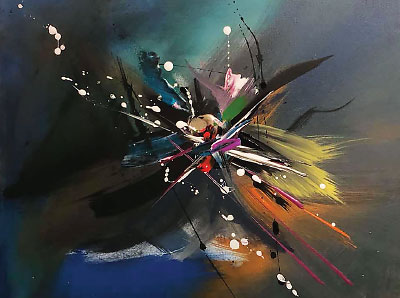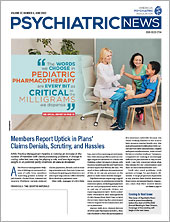People who work on computers all day are adept at navigating among numerous documents, webpages, and software applications. If there are too many pages open and software programs operating in the background, the computer may crash.
That’s not unlike the typical person’s brain with attention-deficit/hyperactivity disorder (ADHD), says mental health advocate and Chicago-based artist Tracey Messlein Newport. Each “open page” in the brain represents a distracting thought, emotion, impulse, or feeling that can easily overwhelm an individual or prevent tasks from being completed.
After a referral from her endocrinologist when she was an adult, Newport’s primary care physician diagnosed her with ADHD. Looking back over the years, Newport said, she realized that classic symptoms of ADHD had impacted most aspects of her life.
“The more I thought about it, the more I realized ‘I cannot believe I didn’t recognize the diagnosis before, and no one around me noticed it either,’ ” she told Psychiatric News.
For instance, Newport had a difficult time focusing on academic studies and sticking with one job for very long. She noted that for people with ADHD, “our brains are constantly searching for dopamine in a new hobby, new job, or the next shiny bright object. Boredom sets in, and it’s harder to maintain focus.”
Her experience is that many people erroneously think that adults with ADHD are “lazy or not as bright as others—in fact, our brains are moving twice as fast and picking up on all the little sounds, movements, and activity in the room. The sensory overload is exhausting.”
While academics proved difficult, art came easily to her. “I’ve been drawn to art since I was young—it has been the only thing that enables me to focus for long periods,” she said.
Newport explained that she more readily absorbs and uses visual information, and painting enables her to stand up and move around freely, which are easier for her than sitting still.
She privately sold and donated dozens of paintings over the years, and one of her paintings, “reVeriE,” was featured for ADHD Awareness month in October 2021 (
Psychiatric News). “When I started noticing the positive impact I was making through my art, I wanted to share my art with the public,” she noted. “I want others to understand what it is like to have ADHD and to dissolve the stigma surrounding [the disorder],” she added.
Newport’s treatment has included medication and behavioral strategies such as mindfulness, but she is interested in learning more about complementary and alternative therapies for ADHD.
“Some people with ADHD don’t want to or cannot take medications, and I wish that there was more information available about alternative forms of treatment for those seeking relief from their symptoms,” said Newport.
Newport is now blending her passions—art and mental health advocacy—as she works her way toward an art therapy degree.
“With the proper diagnosis, therapy, and treatment, I have a better chance at succeeding this time. I’m more hopeful than ever.” ■
Resources
Tracey Messlein Newport can be reached for questions about her art or advocacy work at
[email protected].

